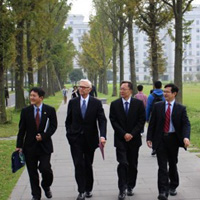W&M delegation visits Chinese partners
In October, an eight-member delegation from William & Mary spent a little more than a week visiting some of the university’s most important Chinese partners in Beijing, Chengdu and Shanghai, reconnecting with alumni and friends and fortifying key relationships.
President Taylor Reveley, William & Mary Confucius Institute (WMCI) Director Yanfang Tang and Stephen Hanson, vice provost for International Affairs and director of the Reves Center for International Studies, led the delegation. Other important university leaders on the trip: Dean of Arts & Sciences Kate Conley, Associate Dean of Business Bud Robeson, Associate Dean of Law Ron Rosenberg, Executive Director of Regional and International Advancement Sani Silvennoinen and Assistant to the President and Provost Jeremy Martin.
The journey began with a reception for Tribe alumni and friends in downtown Beijing, not far from Tiananmen Square. Nearly 50 people -- including both Chinese and U.S. alumni from the schools of Arts and Sciences, Business and Law – heard welcoming remarks from Reveley and met old and new friends.
The next morning was declared “William & Mary Day” at Beijing Normal University, the WMCI partner institution. The delegation participated in high-level meetings with BNU leadership, including President Dong Qi and Vice President Fanghua Hao.
Reveley received an honorary professorship from the BNU School of Law, which he followed with an address on the history and future of the U.S. War Powers Act to BNU law students. Reveley said the students “did a remarkable job” of following the discussion, delivered in English, of U.S. constitutional “mysteries.”
Reveley called it “a marvelous beginning to a very important trip to explore and spur William & Mary’s growing ties with Chinese universities. There is rich potential for student and faculty exchange, joint conferences and collaborative research.”
“Our friends at BNU could not have made us feel more welcome,” he continued. “To our delight, this scenario was repeated over and over throughout the trip.”
For example, the W&M delegation arrived on the BNU campus to find its library and main administration building displaying many reminders of William & Mary’s campus, its history and current achievements. The delegation also visited Guozijian, the Imperial College -- an institution of higher learning even older than William & Mary.
Other trip highlights included a visit to Hanban, the headquarters for Confucius Institutes around the world, and to Tsinghua University, one of China’s most famous institutions of higher learning and the host of a long-standing student exchange program with W&M.
At Hanban, Reveley and the delegation toured interactive exhibits about Chinese opera, paper-cut artwork and calligraphy. At Tsinghua University, the delegation met with a group of senior university leaders, led by Chair of the University Council Hu Heping, where they discussed how to deepen the institution’s friendship and collaboration.
Reveley and Hanson shared dinner with Hanban Director-General Madame Xu Lin, Deputy Director Wang Jongli and North American CI Program Coordinator Ren Shifang, and discussed future partnerships between W&M and the CI.
The delegation’s next stop was Chengdu, capital of Sichuan Province and home of the University of Electronic Science and Technology of China (UESTC) -- one of William & Mary’s most important overseas partners in the fields of science and technology. They traveled to UESTC’s new campus for a visit with the university leadership, followed by a speech by Reveley on the role of higher education partnerships in U.S.-China relations, a question-and-answer session with UESTC students and what Hanson described as “an elegant dinner.”
The delegation’s final destination was Shanghai, where more than 80 William & Mary alumni and friends from all over Eastern China attended a reception. The visit concluded with a tour of Fudan University, which is hosting the new China program of the Mason School’s eMBA program this fall, and a meeting with Vice President Lin Shangli and Fudan University’s leadership team.
“That evening, as our delegation enjoyed a final night of relaxation, we could truly celebrate the end of a sometimes exhausting, but always exhilarating, journey through a country whose fate will help determine the future of global prosperity and security,” Hanson said, “and a country where Tribe Pride has spread very widely indeed.”
















